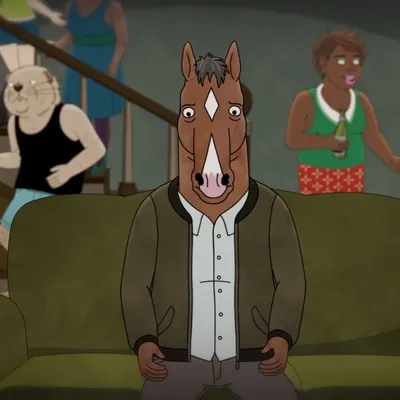
The ÔÇ£difficult menÔÇØ era of modern television theoretically ended when Mad Men concluded back in 2015. But look around. There are still plenty of television shows that center on male anti-heroes: narcissistic, unethical, and criminal guys who seem incapable of change. ThereÔÇÖs Better Call Saul and Ozark and Narcos (now Narcos: Mexico) and The New Pope and Ray Donovan. Bad dudes struggling to touch base with their inner Jiminy Crickets havenÔÇÖt entirely disappeared from the TV landscape, but the TV landscape has swelled to such an extent over the past five years that they feel less central to it. ThereÔÇÖs more space than ever to tell episodic stories and more freedom to center those stories on people who arenÔÇÖt awful guys coming to terms with their bad behavior.
That brings me to BoJack Horseman, the brilliant Netflix series about a man ÔÇö well, technically, a horseman ÔÇö who possesses all the qualities of a classic TV anti-hero. HeÔÇÖs self-involved, inconsiderate, alcoholic, drug-addicted, sometimes misogynistic, emotionally abusive, and largely oblivious to the consequences of his actions, and he has spent five and a half seasons trying desperately to change all that. The second half of BoJackÔÇÖs sixth and final season, which arrives Jan. 31 on Netflix, allows him one last grasp at redemption. But because BoJack Horseman is a Hollywood satire that underscores the hypocrisy of the entertainment industry, the concluding eight episodes also serve as a commentary on how our culture grants absolution and the way it lionizes men for simply owning up to, if not fully correcting, their mistakes. ItÔÇÖs a comedy that aggressively wrestles with what it means to be a man and to be a TV show attempting to address toxic masculinity.
As theyÔÇÖve done throughout the series, especially in later seasons, BoJack creator Raphael Bob-Waksberg and his team make a point of emphasizing that the world stretches beyond the concerns of one flawed equine male. Unlike the holy trinity of Difficult Men prestige dramas ÔÇö The Sopranos, Breaking Bad, and Mad Men, which zero in on their protagonists in their final frames ÔÇö BoJack Horseman ends with a two-shot, a reminder that this series was never just about a single (horse)man. If Mad Men felt like the end of a specific chapter in anti-heroic TV, BoJack Horseman, which debuted less than a year before Mad MenÔÇÖs finale, serves as the epilogue that officially closes the book.
As the concluding stretch begins, BoJack, the former star of the ÔÇÖ90s sitcom HorsinÔÇÖ Around, voiced with gravelly sarcasm and melancholy by Will Arnett, seems to be in a good place. HeÔÇÖs out of rehab and living clean. With his brown mane now an appropriately sober gray, heÔÇÖs teaching drama at Wesleyan University and actually enjoying working with the students. Then he gets word that reporter Paige Sinclair (voiced by Paget Brewster as if she were a graduate of Rosalind RussellÔÇÖs His Girl Friday School of Journalism) is working on some sort of expos├® about something awful he did in the past. ÔÇ£They canÔÇÖt get me on old shit,ÔÇØ BoJack protests. ÔÇ£IÔÇÖm a different person now.ÔÇØ As most of us know: Yes, ÔÇ£theyÔÇØ totally can get you on old shit, and often with good reason. Neither of BoJackÔÇÖs closest friends ÔÇö Diane (Alison Brie) and his agent, Princess Carolyn (Amy Sedaris) ÔÇö will let him play the victim in this situation. The show doesnÔÇÖt either.
BoJack Horseman handles the developments in its long-running Me TooÔÇôstyle story line with the showÔÇÖs signature mix of thoughtfulness, earned snark, and occasional outright silliness. It does the same thing in its treatment of Diane, who earns almost as much screen time as BoJack as she adjusts to taking antidepressants, living with her boyfriend in Chicago (ÔÇ£Why does everything have to be ÔÇÿChicago styleÔÇÖ here?,ÔÇØ she laments. ÔÇ£We get it. WeÔÇÖre in ChicagoÔÇØ), and attempting to write a book. DianeÔÇÖs struggle with depression is handled with humor ÔÇö in a brief, upbeat musical sequence, she keeps holding up her bottle of meds as if sheÔÇÖs starring in an old Mentos commercial ÔÇö as well as great care and sincerity. And while making space for a womanÔÇÖs experience, BoJack Horseman sneaks in some hilarious jabs at film and TV projects that try to gain feminist credibility for doing the same thing on a more superficial basis: When Princess Carolyn expresses interest in having Sofia Coppola direct a new Robin Hood from Maid MarianÔÇÖs point of view, sheÔÇÖs told that Coppola is ÔÇ£booked for the next year developing a new Peter Pan from WendyÔÇÖs point of view.ÔÇØ Very few shows could incorporate that many serious, comedic, and meta fabrics into a single thread and effectively pull it through the eye of a needle, but BoJack Horseman does it with ease. ItÔÇÖs one of many reasons I already miss this smart, simultaneously earnest and cynical show.
The animators donÔÇÖt say good-bye without giving us a few more of their ingenious visual gags that flash by so quickly they can easily be dismissed, if not missed entirely. Even those sometimes signify something valuable. In one of the final episodes, thereÔÇÖs one instance, lasting just a few seconds, in which firefighters attempt to rescue a cat from a tree. The cat is sitting on a branch and holding a briefcase. ÔÇ£Guys,ÔÇØ she says apologetically, ÔÇ£IÔÇÖm really sorry this keeps happening.ÔÇØ ThatÔÇÖs the central message of BoJack Horseman tucked into one clever little joke. We all have animal instincts, and we try repeatedly to overcome them. But sometimes we need extra hands to carry us and place us back on the ground.


